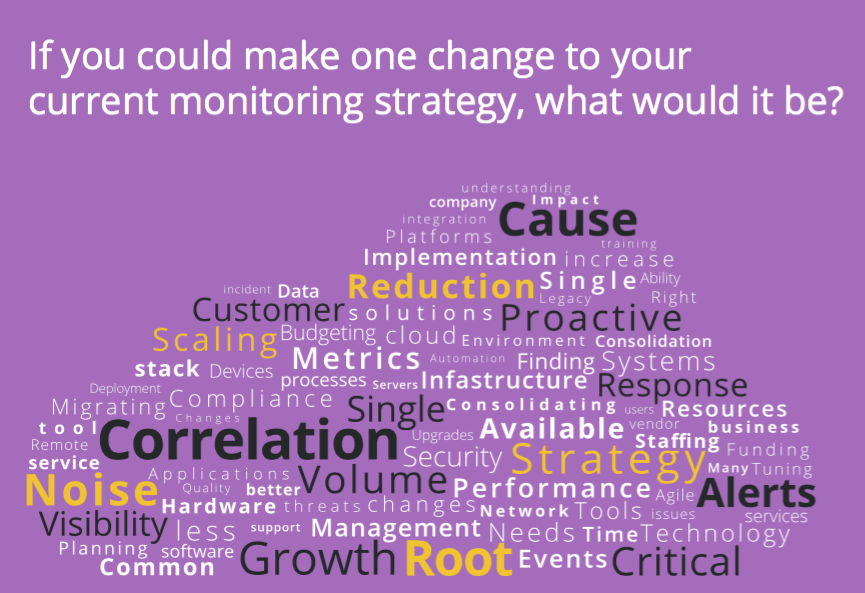JFrog announced a new machine learning (ML) lifecycle integration between JFrog Artifactory and MLflow, an open source software platform originally developed by Databricks.
We're all technology companies. Every second of downtime hurts. Monitoring at scale is hard. And that's just the beginning of what you shared in our recent survey.
We invited you to tell us about the state of monitoring. Tales of woe and glory from more than 1,700 ops experts provided the most articulate, profound, comprehensive summary of IT Ops life ever assembled.
We thought you'd all benefit from what you shared so we published the results. You represent five continents, large and small companies (modal reply: more than 10,000 employees), large and small teams (modal reply: less than 10 members), and both traditional IT and DevOps organizations.
Here's what fascinated me...
You rely on many tools to monitor your infrastructure.
■ Each team member is responsible for triaging between 10 and 50 alerts per day.
■ In an eight-hour shift, that means you're each working about 10 issues simultaneously assuming you don't inherit orphans from previous shifts (which you do!).
■ Translation: there are fire-swallowing, tightrope-walking, lion tamers working the e.coli route for Carnival Cruise Line with easier jobs than yours.
The more you've invested in agility and velocity, the more effective you are at reducing downtime.
■ Self-described "DevOps" organizations are more than twice as likely to deploy code and/or infrastructure changes at least a few times per day (31% for DevOps orgs vs. 15% overall).
■ They're also more than twice as likely to have cloud-based infrastructure (32% of DevOps orgs vs. 13% overall).
You're dissatisfied with the current reliability of your monitoring and incident management process.
■ Nearly 80% of you say the most challenging part of your job is suppressing alert noise.
■ The problem's not going away: more than 55% are dissatisfied with the current monitoring strategy. Your comments also indicate the problem won't improve in the next 12 months without a better way to manage the growing workload.

A bleak picture perhaps best summarized by Carlos from a midwestern credit union who says if he could change one thing about his organization's current monitoring strategy it would be "to focus on the only thing that matters: reducing noise." Carlos, you're right. Human beings alone can't fix a problem created by machines. We've been in this position before … before there was client-server, TCP, DNS, virtualization, cloud.
We've approached each challenge with the same tenacity, the same passion, the same commitment to solving problems with technology. We'll do it again. This time, with better automation and collaboration. Soon, machines and people will speak a common language. And when they do, we'll be the first to share how great technology plus your ingenuity makes life better for everyone.
Dan Turchin is VP Product at BigPanda.
Industry News
Copado announced the general availability of Test Copilot, the AI-powered test creation assistant.
SmartBear has added no-code test automation powered by GenAI to its Zephyr Scale, the solution that delivers scalable, performant test management inside Jira.
Opsera announced that two new patents have been issued for its Unified DevOps Platform, now totaling nine patents issued for the cloud-native DevOps Platform.
mabl announced the addition of mobile application testing to its platform.
Spectro Cloud announced the achievement of a new Amazon Web Services (AWS) Competency designation.
GitLab announced the general availability of GitLab Duo Chat.
SmartBear announced a new version of its API design and documentation tool, SwaggerHub, integrating Stoplight’s API open source tools.
Red Hat announced updates to Red Hat Trusted Software Supply Chain.
Tricentis announced the latest update to the company’s AI offerings with the launch of Tricentis Copilot, a suite of solutions leveraging generative AI to enhance productivity throughout the entire testing lifecycle.
CIQ launched fully supported, upstream stable kernels for Rocky Linux via the CIQ Enterprise Linux Platform, providing enhanced performance, hardware compatibility and security.
Redgate launched an enterprise version of its database monitoring tool, providing a range of new features to address the challenges of scale and complexity faced by larger organizations.
Snyk announced the expansion of its current partnership with Google Cloud to advance secure code generated by Google Cloud’s generative-AI-powered collaborator service, Gemini Code Assist.
Kong announced the commercial availability of Kong Konnect Dedicated Cloud Gateways on Amazon Web Services (AWS).
Pegasystems announced the general availability of Pega Infinity ’24.1™.




